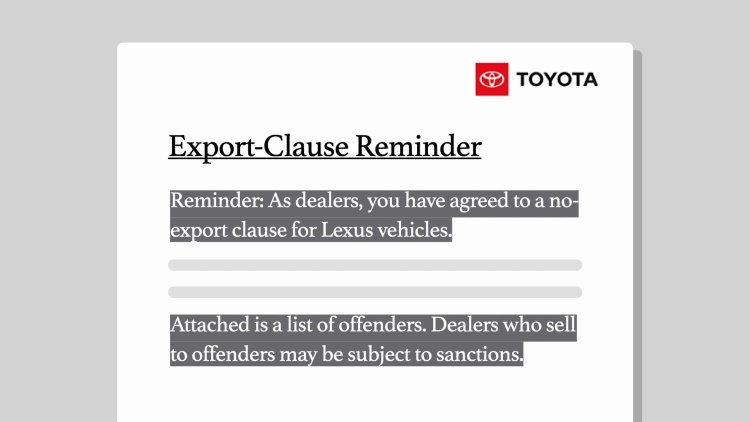Della Penna v. Toyota Motor Sales, U.S.A., Inc.
California Supreme Court
902 P.2d 740, 11 Cal. 4th 376, 45 Cal. Rptr. 2d 436 (1995)

- Written by Sean Carroll, JD
Facts
In order to protect its sales interests in Japan, Toyota Motor Sales, U.S.A., Inc. (Toyota) (defendant) put a clause in its dealership agreements that prohibited dealers from selling Lexuses (a Toyota subsidiary) to customers outside the United States. John Della Penna (plaintiff) made a good profit buying Lexuses at retail and exporting them to Japan for resale. After finding out about Della Penna’s business and other similar businesses, Toyota sent a letter to all of its Lexus dealers containing an “offenders” list of dealers involved in exporting Lexuses. The list included Della Penna, and the letter stated that doing business with anyone on the offenders list could lead to sanctions from Toyota. Eventually, Della Penna was not able to buy any more Lexus vehicles. Della Penna brought suit, alleging tortious interference with his economic relations. The trial court’s jury instructions included a requirement that Della Penna prove that Toyota’s alleged interference was wrongful. The jury found in favor of Toyota. The court of appeal reversed, holding that wrongfulness is not a required element of interference with prospective contractual relations. The California Supreme Court granted Toyota’s petition for review.
Rule of Law
Issue
Holding and Reasoning (Arabian, J.)
Concurrence (Mosk, J.)
What to do next…
Here's why 907,000 law students have relied on our case briefs:
- Written by law professors and practitioners, not other law students. 47,100 briefs, keyed to 996 casebooks. Top-notch customer support.
- The right amount of information, includes the facts, issues, rule of law, holding and reasoning, and any concurrences and dissents.
- Access in your classes, works on your mobile and tablet. Massive library of related video lessons and high quality multiple-choice questions.
- Easy to use, uniform format for every case brief. Written in plain English, not in legalese. Our briefs summarize and simplify; they don’t just repeat the court’s language.





